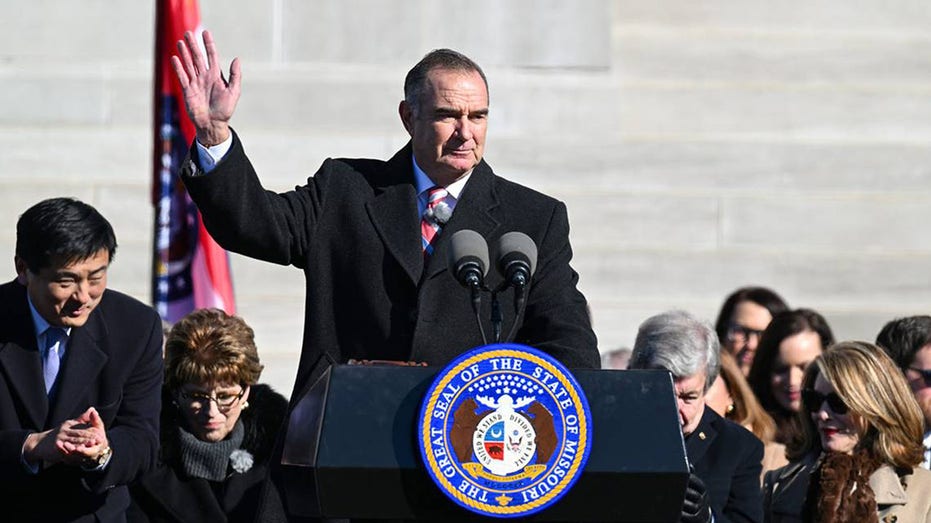Federal judge blocks Trump’s expanded deportation plan over due process concerns for illegal immigrants

A federal judge on Friday blocked the Trump administration from expanding the expedited removal of illegal immigrants, saying the risk of applying fast-track deportations in the interior of the United States is too great and could impact foreigners who aren’t eligible. The ruling by U.S. District Judge Jia Cobb in Washington, D.C., prevents the Trump administration from using expedited removal for immigrants granted parole status. “The Court does not cast doubt on the constitutionality of the expedited removal statute, nor on its longstanding application at the border,” Cobb wrote in a 48-page opinion. BOASBERG CLEARED TO RULE ON CECOT MIGRANT DEPORTATIONS AFTER APPEALS COURT DECISION “It merely holds that in applying the statute to a huge group of people living in the interior of the country who have not previously been subject to expedited removal, the Government must afford them due process. The procedures currently in place fall short.” Earlier this month, Cobb temporarily blocked the Trump administration from efforts to expand fast-track deportations of immigrants who legally entered the U.S. under humanitarian parole. US APPEALS COURT BLOCKS TRUMP CONTEMPT PROCEEDINGS ORDERED BY BOASBERG Fast-track deportations allow federal authorities to remove someone from the country without seeing a judge first. Expedited removal has been used by the Trump administration to quickly remove illegal immigrants, a major hallmark of President Donald Trump’s campaign. Meanwhile, the administration has pressured immigration authorities to ramp up deportations. Fox News Digital has reached out to the White House and the Department of Homeland Security. The Associated Press contributed to this report.
Pro-Palestinian conference panelist calls US ‘evil,’ urges ‘destroying the idea of America’

A panelist speaking at the “People’s Conference for Palestine” in Detroit on Friday called the United States “an evil country” and expressed a need to “destroy the idea of America in Americans’ heads.” Speaking on a panel titled “No Weapons for Genocide: The People Demand an Arms Embargo,” Sachin Peddada, a Ph.D. student in economics and research coordinator at Progressive International, repeatedly ripped on the United States as an “empire” motivated by greed. In response to a question about how Americans can get more involved, Peddada paraphrased a quote by deceased Palestinian author Bassel al-Araj, saying, “The average American will never understand the plight of the Palestinian person because the state of Israel is a carbon copy of the United States. “And, therefore, the thing to do is to destroy the idea of America in Americans’ heads so that they can see the humanity of everybody outside the warping of American exceptionalism and imperialism and all these evil things.” As Peddada said these words, the crowd broke into applause. WHITE HOUSE DEMANDS ALL GAZA HOSTAGES RETURN HOME ‘THIS WEEK’ AMID STALLED TALKS Peddada continued, saying, “We have to dismantle this idea of American exceptionalism, of supremacy, of being beyond reproach. “I think it’s very important that we normalize criticism as a healthy process and learn from our experiments in the world to push the boundaries of what is possible, to continue to fight for more and more and to see how the empire responds to us, to continue to push farther and harder.” At another point during the panel, Peddada declared, “We live in an evil country.” He said that, since Oct. 7, 2023, “We can say with certainty that the U.S. has been the most complicit country — complicit is not even the right word to use — but the most responsible country for what is happening not only in Gaza but also the West Bank and also all over the global south.” Peddada claimed that the U.S. is a country that has “functionally for decades been the sole superpower of the world” and has “an agenda that is driven primarily by the accumulation of profit at the expense of human lives. COLUMBIA PROFESSOR WHO CALLED OCT. 7 HAMAS ATTACKS ‘AWESOME’ TO TEACH COURSE ON ZIONISM “To obfuscate that point or beat around the bush there does not serve us; we live in an evil country, that’s just what’s happening,” he said as the crowd again broke into applause. “That doesn’t mean we’re all evil,” he added. “But it does mean we have a unique responsibility. We have a unique position here in the heart of the empire to act in solidarity with all of our siblings in Gaza and in the West Bank, all around the world.” Commenting on the remarks, one user on X posted, “As an American, I find this galling.” “My culture and history have already been relentlessly attacked — statues of Washington, Jefferson, and other Founders torn down as ‘controversial,’” he said. “Now we have conference speakers openly talking about ‘destroying the idea of America.’” SQUAD MEMBERS SUED FOR ‘INCITING’ COLUMBIA ANTI-ISRAEL ENCAMPMENT The People’s Conference for Palestine, organized by a dozen pro-Palestinian groups, began Friday and will run through Sunday. Even before it started, the gathering drew scrutiny for featuring speakers with extremist views, including two former prisoners of Israel released in a Hamas deal, alongside Rep. Rashida Tlaib, D-Mich., a prominent anti-Israel congresswoman. CLICK HERE TO GET THE FOX NEWS APP The conference opened Friday afternoon with an elaborate opening ceremony, in which a speaker, after leading the crowd in chants, invited attendees to rise for “our national anthem” as a band began playing a song in a foreign language. People wearing keffiyehs proceeded in, holding Palestinian flags. Fox News Digital reached out to Progressive International and the People’s Conference for Palestine for comment but did not immediately receive a response.
Minnesota Gov. Tim Walz says it’s time to ‘take serious action’ after deadly school shooting

Minnesota Gov. Tim Walz on Friday said it was time to “take serious action” in the state legislature after a deadly shooting at a Catholic school in Minneapolis this week. “It’s time to take serious action at the State Capitol to address gun violence,” the Democrat and former 2024 vice presidential candidate wrote in an X post. Walz has been considering a special session on guns next month at the state capitol and has been calling legislators after a fatal shooting at the Annunciation Catholic Church Wednesday, according to FOX 9 Minneapolis-St. Paul. An 8-year-old boy, Fletcher Merkel, and a 10-year-old girl, Harper Moyski, were killed at the back-to-school event. Eighteen others were injured, including 15 children. WHAT LEADS SOMEONE TO COMMIT A MASS SHOOTING? TRUMP ADMIN, RFK JR PLAN TO FIND OUT The shooter’s mother, Mary Grace Westman, previously refused to talk to police and retained a lawyer, Fox News reported. Minneapolis Assistant Police Chief Christopher Gaiters said at a news conference Friday that, with the cooperation of the Minnesota Department of Safety’s Bureau of Criminal Apprehension, there has been “conversation” with Westman, “and I’m not at liberty to go any further.” When asked what changes the city has made since the 2020 George Floyd riots to respond to incidents, Mayor Jacob Frey said, “What this is more about than specific changes is practice, and we practice a whole lot. We practiced the coordination through our incident management system. “We practiced communication channels and how that would work in a time of crisis. We practiced making sure people understood exactly what their responsibility was regardless of the events that might occur. And that may sound like a small thing. It’s not.” MINNESOTA BISHOP REBUKES DEM MAYOR FOR DISMISSING PRAYER FOLLOWING DEADLY CATHOLIC SCHOOL ATTACK He said the “flow of information was drastically improved,” adding that the governor had immediately offered assistance after the shooting. CLICK HERE TO GET THE FOX NEWS APP Gaiters said the Minneapolis Police Department was conducting additional patrols at all schools and religious institutions. Fox News Digital has reached out to Walz’s office for comment.
Legal group sues FDA over puberty blocker records, citing alleged Biden-era cover-up

America First Legal (AFL) sued the Food and Drug Administration on Friday to obtain Biden-era records related to the government’s internal guidance for the recommended use of puberty blockers for kids. The Trump-aligned legal group previously uncovered communications from the former administration through a Freedom of Information Act (FOIA) request, which reportedly showed the FDA knew that these drugs increased mental health risk but still recommended approving them for kids. Following those uncovered communications, AFL followed up with a separate FOIA requesting documents specifically pertaining to the FDA’s internal guidance for the off-label use of these drugs. Despite acknowledging the federal information request, the FDA has not cooperated, and the deadline to produce documents is up. DEMOCRATIC STATES SUE TRUMP ADMIN OVER ENDING SEX CHANGE SURGERIES FOR MINORS “The Biden administration pushed gender-denying treatments on American kids. Now, it’s time to expose what officials really knew,” AFL counsel Will Scolinos, said. Similar to AFL’s current FOIA request, the group was required to engage in litigation to compel the release of the first set of documents. But, eventually, documents were released that seemed to show the Biden-era Division of General Endocrinology at the FDA recommended the agency approve puberty blockers for children despite the knowledge that there were negative impacts associated with them, such as increased depression, suicidality and seizure risks. “There is definitely a need for these drugs to be approved for gender transition,” an FDA official from the agency’s endocrinology division stated in an email uncovered by AFL. In the same communications, the FDA official also explicitly states that studies found “increased risk of depression and suicidality, as well as increased seizure risk.” Such findings have been confirmed by other studies as well. Researchers at the University of Texas sampled 107,583 patients 18 and older who had gender dysphoria, including some who underwent gender surgery, and concluded that “gender-sensitive mental health support … to address post-surgical psychological risks” is a “necessity.” PROGRESSIVES TRAPPED IN ‘MISINFORMATION BUBBLE’ ABOUT TRANSGENDER YOUTH TREATMENTS, ATLANTIC WRITER ADMITS Males who received surgery had depression rates of 25% compared to males without surgery, who had rates slightly below 12%. Anxiety rates among that group were 12.8% compared to 2.6%. The same differences were seen among females as well. Those with surgery had 22.9% depression rates compared to 14.6% in the non-surgical group. Females who did get surgery also had a rate of anxiety of 10.5% compared to 7.1% for girls who had not gotten surgery. Fox News Digital reached out to the FDA for comment but did not immediately receive a response.
Federal court strikes down Trump tariffs as illegal under federal law in appeals ruling

A federal appeals court has ruled that most of President Donald Trump’s tariffs are illegal. “We affirm the CIT’s holding that the Trafficking and Reciprocal Tariffs imposed by the Challenged Executive Orders exceed the authority delegated to the President by IEEPA’s text,” the opinion from the Washington-based U.S. Court of Appeals for the Federal Circuit states. “We also affirm the CIT’s grant of declaratory relief that the orders are invalid as contrary to law.” In a 7-4 vote, the divided court allowed the tariffs to remain in place through Oct. 14 to give the Trump administration a chance to file an appeal with the U.S. Supreme Court. TRUMP’S TARIFF POWER GRAB BARRELS TOWARD SUPREME COURT On Truth Social, Trump criticized the ruling, saying all tariffs were still in effect. “Today a Highly Partisan Appeals Court incorrectly said that our Tariffs should be removed, but they know the United States of America will win in the end. If these Tariffs ever went away, it would be a total disaster for the Country,” he wrote. “It would make us financially weak, and we have to be strong. The U.S.A. will no longer tolerate enormous Trade Deficits and unfair Tariffs and Non Tariff Trade Barriers imposed by other Countries, friend or foe, that undermine our Manufacturers, Farmers, and everyone else. “ Trump has made tariffs a pillar of his second term as a way to compel other nations to renegotiate trade deals with the United States and to give the U.S. economic concessions. “President Trump lawfully exercised the tariff powers granted to him by Congress to defend our national and economic security from foreign threats. The president’s tariffs remain in effect, and we look forward to ultimate victory on this matter.” White House spokesman Kush Desai told Fox News. TRUMP’S ‘LIBERATION DAY’ TARIFFS COULD HIT A SNAG IN COURT TODAY. HERE’S WHAT TO KNOW Revenue from tariffs totaled $142 billion by July, more than double what it was at the same point the year before. Congress has the power to impose taxes, including tariffs. But, in recent decades, lawmakers have ceded authority to the president, The Associated Press reported. At issue was the legality of Trump’s attempt to use the International Emergency Economic Powers Act (IEEPA) — a 1977 emergency law — to enact the steep import fees and impose additional tariffs on certain trading partners. The Trump administration argued that courts approved President Richard Nixon’s emergency use of tariffs in a 1971 economic crisis that arose from the chaos that followed his decision to end a policy linking the U.S. dollar to the price of gold, according to the AP. Trump used the IEEPA law to enact the tariffs during his April 2 “Liberation Day” event. In his post, Trump said allowing Friday’s decision to stand would “literally destroy the United States of America.” “At the start of this Labor Day weekend, we should all remember that TARIFFS are the best tool to help our Workers, and support Companies that produce great MADE IN AMERICA products,” he said. “For many years, Tariffs were allowed to be used against us by our uncaring and unwise Politicians. Now, with the help of the United States Supreme Court, we will use them to the benefit of our Nation, and Make America Rich, Strong, and Powerful Again! Thank you for your attention to this matter.”
Lawyers for Cook, DOJ trade blows at high-stakes clash over Fed firing

A federal judge in Washington, D.C., on Friday grilled lawyers for the Justice Department and Lisa Cook over President Donald Trump’s historic attempt to fire her from the Federal Reserve. The landmark case is almost certain to be kicked to the Supreme Court for review. Despite the high-stakes nature of the legal dispute, Friday’s hearing ended after more than two hours without clear resolution. U.S. District Judge Jia Cobb, a Biden appointee, declined to immediately grant the temporary restraining order sought by Lisa Cook’s attorneys, which would keep her in her role on the Fed’s Board of Governors for now. Cook’s lawyers included the request for the temporary restraining order in the lawsuit filed in federal court on Thursday, challenging Trump’s attempt to fire her from her position on the independent board due to allegations of mortgage fraud. APPEALS COURT BLOCKS TRUMP FROM FIRING FEDERAL BOARD MEMBERS, TEES UP SUPREME COURT FIGHT Instead, Judge Cobb ordered both parties to submit any supplemental briefs to the court by Tuesday, shortly before she dismissed the lawyers for the long weekend. Cobb noted the novelty of the case before her, which involves the first attempt by a sitting president to oust a Federal Reserve governor “for cause.” The fraud allegations were first leveled by Bill Pulte, a Trump appointee to the federal agency that regulates Fannie Mae and Freddie Mac. He accused Cook of claiming two primary residences in two separate states in 2021, with the goal of obtaining more favorable loan conditions. Trump followed up by posting a letter on Truth Social earlier this week that he had determined “sufficient cause” to fire Cook, a dismissal he said was “effective immediately,” prompting her attorneys to file the emergency lawsuit. The crux of Friday’s arguments centered on the definition of what “for cause” provisions must entail for removal from the board under the Federal Reserve Act, or FRA, a law designed to shield members from the political whims of the commander in chief or members of Congress. The arguments also centered on Cook’s claims in her lawsuit that Trump’s attempt to fire her amounts to an illegal effort to remove her from the Fed well before her tenure is slated to end in January 2038 to install his own nominee. Lawyers for Cook argued that her firing was merely a “pretext” for Trump to secure a majority on the Fed board, a contention that Cobb admitted made her “uncomfortable.” They also attempted to poke holes in the mortgage fraud allegations, which they said were made on social media and “backfilled.” The case “obviously raises important questions” about the Federal Reserve Board, Cobb said shortly before adjourning court. She also noted that she had not yet made a determination about the alleged “irreparable harm,” prompting her to set the Tuesday filing deadline. TRUMP SAYS HE’S ‘ALWAYS’ READY FOR LEGAL FIGHT AS OUSTED FED GOVERNOR PLANS LAWSUIT Cook’s attorneys argued Friday that Trump’s attempt to fire her violates her due process rights under the Fifth Amendment, as well as her statutory right to notice and a hearing under the Federal Reserve Act. Her lawyer, Abbe Lowell, noted on several occasions that there was no “investigation or charge” from the administration prior to Trump’s abrupt announcement that he would fire Cook. Lowell also vehemently disputed the Justice Department’s allegations that Cook had an “opportunity” to respond to the mortgage fraud accusations leveled by Bill Pulte, noting that they were made just 30 minutes before Trump called for Cook to be removed. He told Cobb that it was the latest attempt by the Trump administration to “litigate by tweet.” A LOOK AT THE UNFOLDING BATTLE BETWEEN TRUMP AND POWELL OVER FED POLICY Lawyers for the Trump administration, for their part, argued that the president has broad latitude to determine the “for cause” provision. Justice Department attorney Yakoov Roth told Cobb that the determination of when to invoke the provision should be left to the president, regardless of whether it is viewed by others as “pretextual.” “That sounds to me like the epitome of a discretionary determination, and that is when the president’s power is at [its] apex,” Roth said. DOJ lawyers also noted that Cook, to date, has not disputed any of the allegations in question and argued there is “nothing she has said” about the allegations that would cause her to not be fired. “What if the stated cause is demonstrably false?” Cobb asked, going on to cite hypothetical concerns that a president could, theoretically, use allegations to stack federal boards with majorities. As for the issue of “irreparable harm,” Justice Department attorneys argued that it would be more harmful for Cook to remain in office, arguing that the “harm of having someone in office who is wrongfully there … outweighs the harm of someone being wrongfully removed from office.” TRUMP ASKS SCOTUS TO UPHOLD FREEZE ON BILLIONS IN USAID PAYMENTS Cook’s attorneys said Friday that in reviewing the lawsuit, the court need not itself establish a definition of what “cause” means under the Federal Reserve Act. Instead, Lowell suggested, the court should instead work backwards to determine whether the accusations leveled by Pulte were in fact “backfilled” by Trump to form the basis of her removal. “It’s very difficult to come up with an 11-page definition of what it is,” Lowell said Friday of the “cause” definition, adding that it is far easier to come up with a one-page definition of “what it’s not.” “Whatever it is, it’s not this,” Lowell said.
Fox News Politics Newsletter: Complex Russia and US relationship continues

Welcome to the Fox News Politics newsletter, with the latest updates on the Trump administration, Capitol Hill and more Fox News politics content. Here’s what’s happening… -Trump admin blocks citizenship for noncitizen voters -Republican Sen. Joni Ernst won’t seek reelection in Iowa in 2026: sources -Abbott signs Texas redistricting map into law, securing major GOP victory ahead of 2026 midterms Russia isn’t backing off from attacking Ukraine and pummeled it with missiles and drones Thursday — just weeks after President Donald Trump met with Russian President Vladimir Putin in Anchorage, Alaska, in an attempt to advance a peace deal. The attack could be a signal Putin is utilizing diplomacy to buy himself more time to advance his goals and continue to attack Ukraine, all while avoiding secondary sanctions that the Trump administration has threatened to impose, according to experts. The time to act is now, according to Rep. Don Bacon, R-Neb., chairman of the House Armed Services Committee’s subcommittee on cyber issues…Read more ‘SAFE AGAIN’: Trump’s looming Chicago takeover puts violent illegal immigrant crimes in spotlight: ‘Incompetent mayor’ ‘REPRESSIVE TACTICS’: Trump’s Chinese student visa push sets off alarm bells amid rising CCP ‘influence’ in US WEAKENED SECURITY: Kamala Harris Secret Service protection revoked by Trump, spokesperson says ‘POLITICAL CONTROL’: ‘Web of dark money’ tied to Obama, Dems fuels green opposition to crucial Trump energy plan PEACE AMID MISSILES: Witkoff meets Ukraine officials in New York ahead of emergency UN Security Council meeting: ‘Very productive’ REMOVAL BLITZ: ICE deported nearly 200,000 so far during Trump’s second term, setting pace for highest level in decade BLOOD AND MONEY: NH mom who killed cancer-stricken husband, 2 children embezzled $600K from employer, owner says JUSTICE BETRAYED: Karen Read tells prosecutors ‘you lost big time’ in first public interview since acquittal Get the latest updates on the Trump administration and Congress, exclusive interviews and more on FoxNews.com.
Noem demands Pritzker ‘abandon’ liberal immigration policies after alleged killer caught

Homeland Security Secretary Kristi Noem is pursuing the extradition of a Mexican national who allegedly stabbed a 24-year-old woman to death in her Illinois apartment, and she is also taking aim at Democratic Gov. JB Pritzker as a result. The suspect, Gabriel P. Calixto, is charged with first-degree murder and domestic battery for allegedly killing Emma Shafer in Springfield, Illinois, in July 2023. Calixto was in the U.S. illegally when the crime was committed, and he was captured by Mexican law enforcement on Thursday. “The vicious illegal alien murderer who has been evading justice for two years after stabbing 24-year-old Emma Shafer has been ARRESTED. We will continue to work with federal authorities to coordinate extradition proceedings,” Noem said in a statement. “THANK YOU to our law enforcement partners for bringing this perpetrator to justice.” DHS REVEALS ILLEGAL MIGRANTS CONVICTED OF CHILD MOLESTATION, RAPE ARRESTED IN DC UNDER TRUMP CRIME CRACKDOWN The announcement comes as the Trump administration is considering a crime crackdown in Chicago, which could lead to a possible surge in National Guard troops and ICE agents conducting operations. “I am calling upon Governor Pritzker, and other leaders in the state of Illinois, to abandon these dangerous sanctuary policies,” Noem added. “We need to return to law and order and put the safety of Americans first.” Noem held a press conference in Springfield in May to criticize the state’s immigration policies. DHS SAYS NOEM IS TEMPORARILY STAYING IN MILITARY HOUSING AFTER FACING ‘VICIOUS DOXXING,’ DEATH THREATS Pritzker is specifically opposing the possible deployment of the National Guard, which is underway in Washington, D.C., to serve as a deterrent to crime. The Democrat said it is “un-American” to send troops into the city at a press conference on Friday. CLICK HERE FOR MORE IMMIGRATION COVERAGE “A U.S. president invading a city with troops. It is un-American. We always need help with crime, but not troops,” he said. The Washington, D.C., crime crackdown has resulted in hundreds of immigration arrests on its own, including alleged gang members of Tren de Aragua and MS-13. Many Democrats have opposed the troop deployment, but there have been degrees of nuance in the criticism and even praise for the takeover in the capital city. The takeover has ranged from federal oversight of the police force to other federal agencies patrolling the streets. NOEM, IN ILLINOIS, CALLS OUT GOV. PRITZKER, CHICAGO’S MAYOR OVER THEIR HANDLING OF CRIMINAL ILLEGAL IMMIGRANTS “This is what we think in just a couple of weeks of experience has worked,” D.C. Mayor Muriel Bowser said Wednesday, saying it’s helped with the seizure of illegal guns. “We think that there is more accountability in the system, or at least perceived accountability in the system, that is driving down illegal behavior. We know that we have had fewer gun crimes, fewer homicides, and we have experienced an extreme reduction in carjackings.” Fox News Digital reached out to Pritzker’s office.
Missouri Gov. Mike Kehoe considers special session to redraw congressional districts after Trump call

Missouri Gov. Mike Kehoe is reportedly planning to call a special session to redraw the state’s congressional maps. On Friday, Kehoe told reporters he wasn’t ready to make a formal announcement. “When we’re ready to make that announcement, we’ll get it out there,” Kehoe said during a stop at the Missouri Soybean Association headquarters, the St. Louis Post-Dispatch reported. “There are a lot of moving puzzle pieces. We’re still making sure what’s going to work is going to work.” TRUMP URGES TEXAS REPUBLICANS TO SWIFTLY PASS REDISTRICTING MAPS WHILE NEWSOM, CALIFORNIA DEMS COUNTER The move comes as President Donald Trump continues to pressure GOP-led states to redraw their political boundary lines to favor Republican candidates in the midterm elections. Missouri has eight House seats, two of which are held by Democrats. Republicans want to change the partisan makeup of the Kansas City-focused 5th District, potentially giving the GOP one additional seat in the House to support Trump’s policies, the website reported. Similar efforts are underway in Texas and California. Last week, Trump alluded to the redrawing of Missouri’s congressional maps. TRUMP, ABBOTT VS. NEWSOM: MAD DASH TO REDO CONGRESSIONAL MAPS IN CALIFORNIA, TEXAS “The Great State of Missouri is now IN. I’m not surprised… We’re going to win the Midterms in Missouri again, bigger and better than ever before!” Trump wrote on Truth Social. Democrats have been issuing fundraising alerts connected to the redistricting battle, the website said. “This isn’t just about one district. It’s about whether Missouri voters get to choose their representatives or whether politicians get to rig the rules to choose their voters. And with Trump’s political machine and a Republican supermajority pushing hard, the danger couldn’t be greater,” said Missouri Democratic Party Chairman Russ Carnahan, a former congressman. Ashley Aune, the state House minority leader, mocked Kehoe, calling him a tool of the president. “The governor’s complete capitulation to the president’s will proves that Donald Trump — not Mike Kehoe — calls the shots in Missouri, while the man Missourians elected to lead our state is a mere puppet responding to his master’s commands,” she wrote.
Trump’s Chinese student visa push sets off alarm bells amid rising CCP ‘influence’ in US

A China expert warns that President Donald Trump’s Chinese student visa push amid trade talks between the United States and China could exacerbate the growing CCP “influence” in American universities. China policy expert Michael Sobolik, a senior fellow at the Hudson Institute, explains where things stand right now, as several conservatives sounded the alarm on how the push could enable the Chinese Communist Party’s influence in the U.S. Sobolik explained that Chinese students in the United States can become a major national security liability, adding that the CCP has taken advantage of Chinese nationals to “advance malign influence operations.” TRUMP IGNITES CONSERVATIVE BACKLASH AFTER OPENING DOOR TO 600,000 CHINESE STUDENTS: ‘WHAT IS THIS MADNESS?’ “They do this by re-appropriating basic and applied research in American universities, taking it over to China, and stealing American innovations, essentially,” he said. “And they also will conduct espionage. They will silence Chinese students on American campuses and force them to either advance the CCP propaganda line or silence them. And that’s just unacceptable.” Sobolik continued by pointing out the history of the trade agreements between Trump and Xi Jinping. “I think it’s partially a function of the fact that [Trump’s] trying to get to a trade deal with Xi Jinping and he wants to smooth that road, make sure there aren’t any bumps along the way, much like he did in his first term when he was trying to get his phase one trade agreement with China negotiated,” he said. REP. GREENE RAISES RED FLAG AFTER TRUMP INDICATES US WILL ACCEPT 600,000 CHINESE STUDENTS President Donald Trump said in a Tuesday cabinet meeting that the “college system would go to hell very quickly” if the Chinese student visa policy were significantly altered. CLICK HERE FOR MORE IMMIGRATION COVERAGE “And it wouldn’t be the top colleges, so it’d be colleges that struggle on the bottom. And you take out 300,000 or 600,000 students out of the system,” Trump said. “I like having, and I told this to President Xi that we’re honored to have their students here. Now, with that, we check in with careful and we see who’s there,” the president continued. “President Trump isn’t proposing an increase in student visas for Chinese students. The 600K references two years worth of visas,” a White House official told Fox News on Thursday. “It’s simply a continuation of existing policy.” TRUMP OPENS DOOR TO 600,000 CHINESE STUDENTS AMID BEIJING TRADE TALKS Sobolik said universities will ultimately go along with the “repressive tactics of China,” as he says students are willing to attend American institutions for their full price. “It’s not just STEM programs and security risks. It is not just what China’s government is doing on these campuses. It’s how universities are complicit in it because they need that money. It’s all about the bottom line for them, and American values suffer in the process,” Sobolik added.

